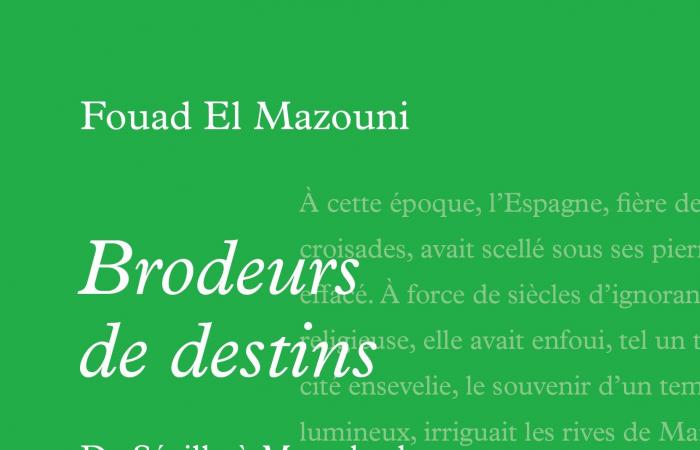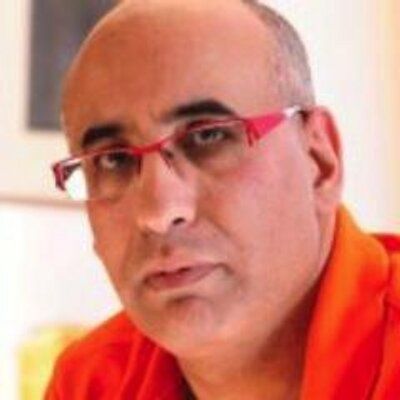Twitter 0 WhatsApp Facebook 0 Messenger
Fouad El Mazouni has just published a novel by editions L‘Harmattan titled “Destinian embroiderers, from Seville to Marrakech”. BIt is more than a historical novel, a human fresco, a song of thread and gold sewn over three centuries, where the Jewish and Muslim voices of Al-Andalus in Marrakech intertwine. Communiqué.
There are novels that are content to tell a story. And then there are those who, like a craftsman’s patient, embroider lives, graze silences, put the flaps of a past dispersed by the winds of history. Destinian embroiderers, from Fouad El Mazouni, belongs to this second category: an ample, scholarly and deeply embodied story, which takes us from Seville to Marrakech through three centuries of memory shared between Muslims and Moroccan Jews.
An epic breath in the frame of memories
It all started in Seville, in 1609, when Ziyad al-Andalusí, Master-Broder Morisque, receives his expulsion order. Like the embroidery point which constantly returns to its source to better leave it, El Mazouni composes a fresco where each generation is transmitted, beyond the blood, a quest: that of remaining faithful to its roots without renouncing the light of the world.
This novel is not only the story of an exile. This is the story of a rooting. That of a uprooted family from Al-Andalus and transplanted on the Moroccan coast, in Salé first, then in Tétouan, finally in Marrakech. Through the destinies of Ziyad, Sirajeddine, Malek, and the Women of the Shadow, powerful and tender, El Mazouni resuscitates an era when cohabitation between Jews and Muslims, although fragile, would generate wonders of humanity.
Hand -sewn characters
Each character is a world. Ziyad the literate resistant, elected to the Council of the Republic of Salé, Samuel his Jewish friend and business partner, Sirajeddine the craftsman in love with a young Jew named Sarah, or Malek, Brodeur in Marrakech, and his impossible love for Keltoum … All vibrate, dream, suffer and hope in a universe where the gestures of crafts rub shoulders with brutality of history.
El Mazouni gives flesh to his heroes with a writing of elegant poetry, often tinged with nostalgia, sometimes crossed by almost mystical visions. He summons the scents of the Friday skhina, the shimmer of the golden threads on silk, the Hebrew songs murmured in the alleys of Tetouan, the sighs of prohibited love.
A novel woven with light
We must salute the author’s tour de force: making a historical novel a sensitive and contemporary work. Because embroiderers of destinies speak, in hollow, of our world: the one where identities are looking for each other, rub, sometimes clash, but where the possibility of the link, of the interculture remains. El Mazouni does not deny tensions, dramas, or ruptures. He inscribes them in a wider fresco where history is not written with saber, but of thread and needle.
The metaphor of embroidery, spun throughout the novel, is not free. It becomes language, philosophy and memory. It is the mode of inscription of these existence in a larger fabric – that of plural Morocco, diasporas, silences and resiliences.
A tribute to the Jews of Morocco and to Andalusian hospitality
Rarely Roman will have better returned this memory shared between Jews and Muslims of the Maghreb, without manicheism or excessive idealization. El Mazouni, as a inhabited storyteller, gives voice to those whom history has often reduced to silence or to the cliché. He wakes up a Judeo-Arab culture woven from exchanges, rituals, songs and cross-intelligence. Through this saga, a whole civilization of hospitality and refinement is reborn.
Conclusion: a transmission masterpiece
Destinian embroiderers is a precious novel. Not only by the richness of his documentation (twenty years of research!), But especially by the light sincerity of his narration. Fouad El Mazouni weaves intimate and universal, exile and anchoring, past and hope. This book is a bridge. A bridge of words, memories and beauty between Seville and Marrakech, between the living and the dead, between the readers of yesterday and those of tomorrow.
Extract from “Destinian embroiderers, from Seville to Marrakech”
-Father, why would our love be a crime?
The rabbi frowned, as if he tried to resolve a divine equation.
– Sarah, we survived by preserving our identity.
Getting married to a Muslim? It would be betraying everything we built!
-But should love not surpass faith? replied, tears in eyes.
– Love does not justify everything. Our laws and traditions are our foundation. If you betray this, you betray your people, he concludes, the voice as cold and sharp as a cleaver.
The sentence fell. But despite her pain, Sarah could not resolve to abandon Sirajeddine. Each meeting with him fueled their love and reinforced his desire for freedom.
Immersed in her reflections, Sarah wondered about her complex identity. His mother, a Marrane – Jewish converted to Catholicism, but suspected of practicing his faith in secret – had lived under the constant threat of rejection, as much of the Christian as Jewish community. This double heritage marked Sarah with a tension between loyalty and desire for freedom. The memory of the persecution of the Inquisition, led to a hellish train, still haunted his mind, recalling how much violence and division had broken lives.
And yet, despite these storms, love between Sarah and Sirajeddine continued to grow, defying prohibitions. Their love fed on a universal language that transcends the laws of men.
Meanwhile, in the Mellah, the agitation reached its peak. Pillards swept through the streets, flames illuminated the night sky. Sarah, witness to this chaos, could not help thinking of Moses and the exodus. La Passah, a feast of freedom, took on the appearance of a tragic recall of the most cruel times. But in the midst of this turmoil, one thing remained unshakable: love.
- Fouad el Mazouni by himself
- Fouad El Mazouni is director of communication agencies in France and Morocco. Author published by Harmattan. Digital designer-writer passionate about the marked accounts and the resonant ideas.
Twitter 0 WhatsApp Facebook 0 Messenger












